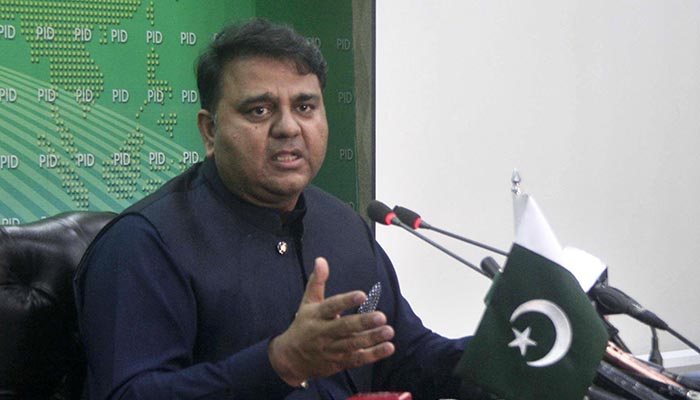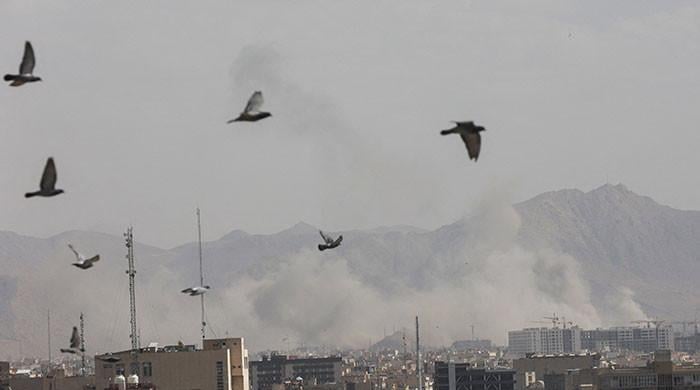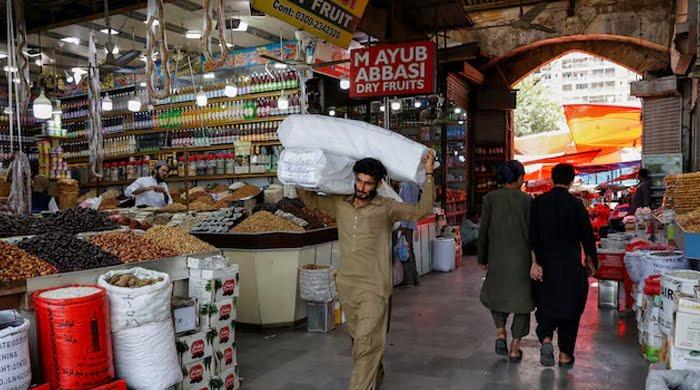An informal meeting with the Minister of Information
Geo News' Lahore bureau chief writes about a meeting Fawad Chaudhry had with journalists
September 25, 2018

Soon after he took charge as the Federal Minister for Information, Fawad Chaudhry held an informal meeting with local journalists. When we reached the hotel where the meeting was to take place, I recalled Prime Minister Imran Khan’s austerity campaign and thought that we would be served biscuits and a cup of tea each. The Honorable Minister was a full 45 minutes late. The waiting journalists were told that the meeting had been shifted to another hall. Here, austerity measures were visible as 30 chairs had been set out for the 60 journalists who had been invited. Never before had I seen such temperance of expenditure where two journalists are expected to share a single seat.
As the number of attendees swelled, the decision was made to shift us to yet another hall. Again, there were not sufficient chairs for everyone. My colleagues took matters into their own hands and dragged in chairs from other halls. We were rewarded for our manual labour by a scrumptious spread. The menu included sandwiches, samosa, pastries, tea and coffee.
Fawad Chaudhry spoke about the general state of affairs in the country and the need to give relief to the public, especially the poor. Journalists, however, were more interested in civil-military relations. When asked about the briefing the Prime Minister received at the General Head Quarters and the ISI Headquarters, Chaudhry said that the army and the government are on the same page and wish to see democracy continue.
But this was not new information. After all, Chaudhry had previously said that the government and the army are not just on the same page, but that the book is the same too.
At this point, talk veered towards relations with Saudi Arabia and China. In a press conference held soon after the Prime Minister’s visit to Saudi, the Minister had announced that the Middle Eastern giant would be the third partner in the CPEC. A few questions were asked about rumours that the Kingdom would soon be investing more than five billion dollars into Pakistan. Chaudhry said that the government was hopeful of an immediate three and a half billion dollar investment.
As for China, the Minister said, they have been reassured that without a doubt, all China-Pakistan Economic Corridor projects will be completed. In return, our old friend had pledged to continue supporting Pakistan, as it previously had. China was also informed of Pakistan’s desire to be on friendly terms with all its neighbouring countries, including India. However, it should not be expected that Pakistan would change its position on Kashmir. Chaudhry emphatically told us that his government did not want war and would prefer to solve all disputes through dialogue.
Most of the audience was aware of these facts. They were more concerned about the new government’s policy on official ads in newspapers and on television. After all, this is a major source of revenue for the media. The Prime Minister does not want the government to publicize itself through these ads, we were told by the Minister. The government would have a strict policy in place where no more than absolutely necessary ads would be allowed. He introduced us to the Principal Information Officer, Shafqat Jalil, who along with other officers of the Information Ministry, had advised the government that for any project that is about to be undertaken, its expenditure on ads should be included in the PC 1.
Jalil enjoys the reputation of being a thorough professional. But I feel compelled to let the Minister for Information know that the previous government was also advised by such officers to run a plethora of ads in newspapers and on television. They had also advised the government that ad placement was not the job of the rulers; therefore this responsibility was handed over to different agencies. In this way, ministers and information officers pocketed a lot of government money. Now the same officers want the current government to adopt a different policy.
If the minister is not aware, then let me inform him, that such a sudden and drastic change would lead to immense pressure on the media industry. Many journalists and media personnel will be out of jobs.
Ansari is the Bureau Chief of Geo News Lahore.
Note: The views expressed are those of the author, and do not necessarily reflect the official policy or position of Geo News or the Jang Group.











